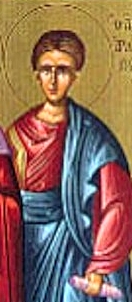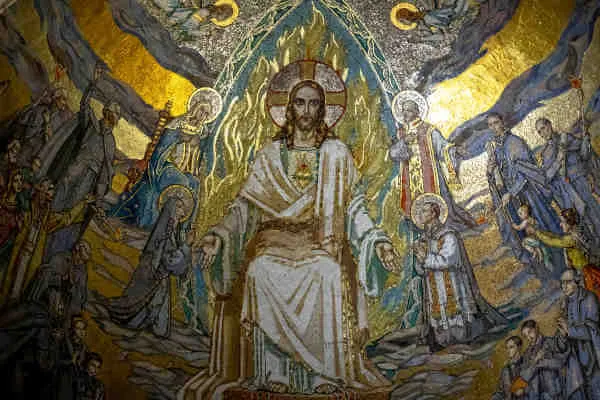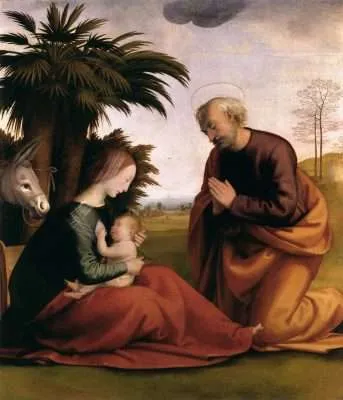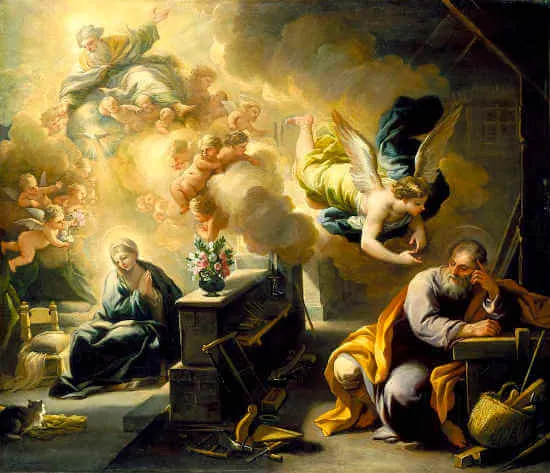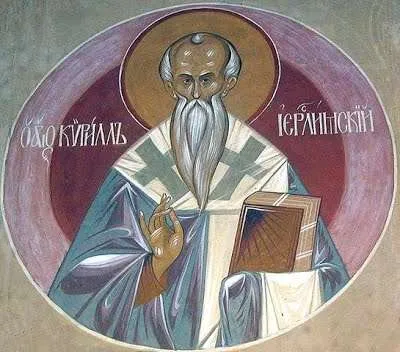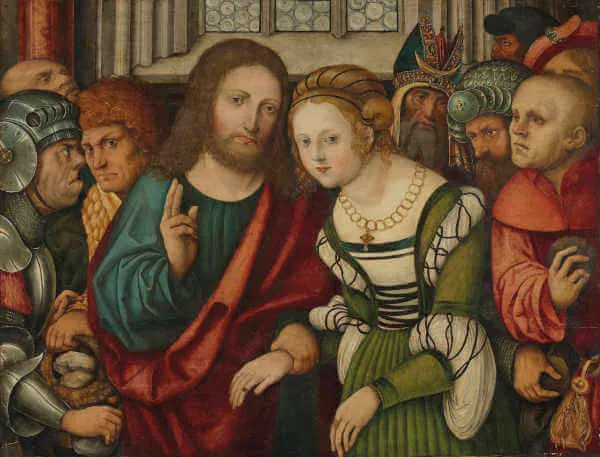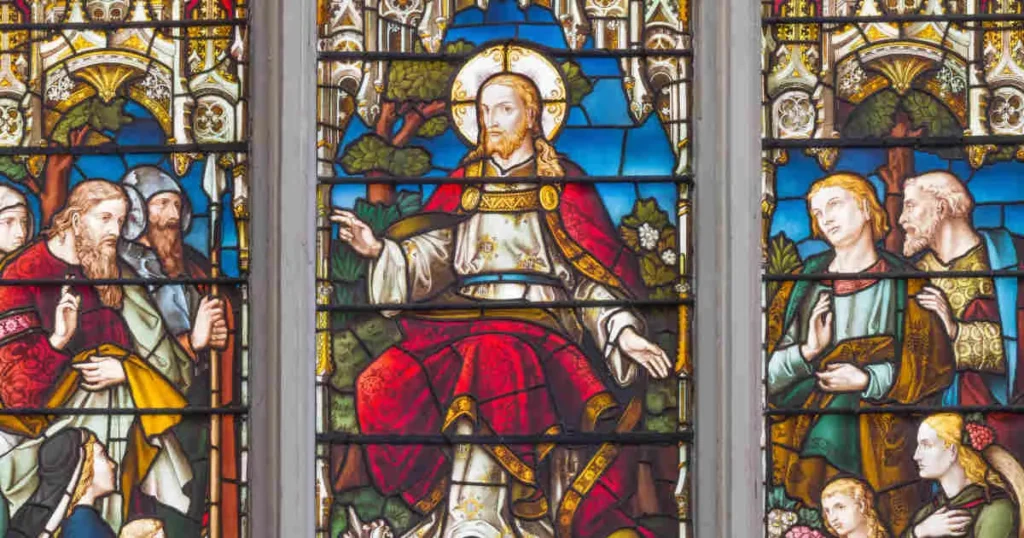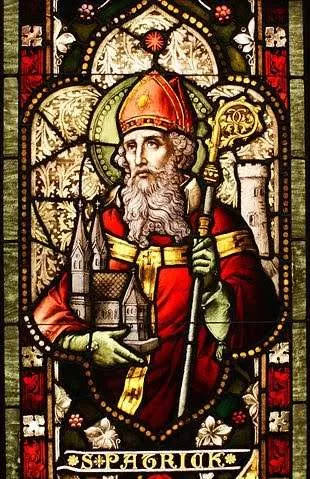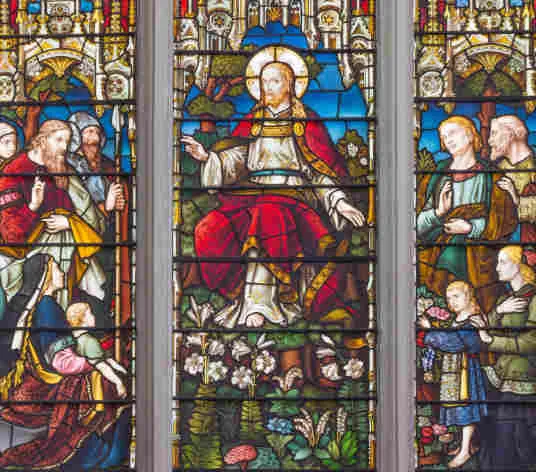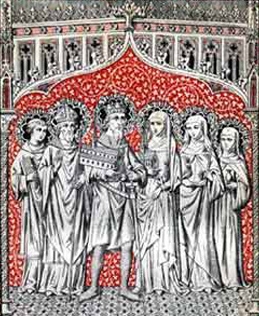Saint Archippus of Colossi
Saint Archippus of Colossi Read More »
Profile
Archippus was the companion of Saint Paul the Apostle. Tradition says he was one of the 72 disciples. In the canonical Epistle to the Colossians, Paul bids him “take heed to the ministry which thou hast received in the Lord, that thou fulfill it.”
Born
Died
Canonized
Source: https://mycatholic.life/saints/saints-of-the-liturgical-year/#TOC-March
Saint Archippus of Colossi Read More »
“Jesus said to those Jews who believed in him, ‘If you remain in my word, you will truly be my disciples, and you will know the truth, and the truth will set you free.’”
Reflection:
These words have the potential to make a transforming difference in our lives. Note that Jesus spoke these words “to those Jews who believed in him.” That is, those who had accepted His word and were, therefore, His true disciples. We who also believe in Jesus should consider these words carefully. The heart of this teaching is twofold: you must come to “know the truth” so that the truth you come to know “will set you free.”
This teaching of Jesus is exceptionally helpful on both a psychological and spiritual level. First of all, on a purely psychological level, one of the greatest helps to good mental health is the truth. Most often when one struggles with various forms of depression, it’s because they are seeing aspects of their life with confusion. “Why did this person do this to me?” Or “How will I ever get through this?” Or “My life is a mess and there is no way out.” These and other similar thoughts will inevitably lead to depression for one simple reason: they are based on erroneous thinking.
One of the best forms of psychological counseling is what could be called “truth therapy.” Every despairing question that we have and every depressing conclusion that we have come to in life must be reexamined in the light of the mind of God. What does God think? What is in the mind of God in this regard?
Those truths that are waiting to be discovered are the truth that “will set you free.” Depression is more easily overcome when we look at our life in the way that God looks at our life. This produces hope, and hope brings freedom to the chains of depression and confusion.
On a spiritual level, these principles apply all the more. The truth about sin, forgiveness, salvation and Heaven must be known deeply and embraced fully. When we deny the truth of sin or forgiveness, then we live within a lie and we remain bound by that lie.
True spiritual freedom that leads to salvation and eternity in Heaven is obtained only when we wholeheartedly embrace the holy and perfect spiritual truth given to us by God. We must clearly know our sin, repent of it, seek the forgiveness of God, amend our lives and live the new life of grace to which we are called.
Reflect, today, upon this powerfully transforming teaching of Jesus: “know the truth, and the truth will set you free.” What psychological and spiritual truths do you need to more deeply know? What confusion or blindness remains? Seek the remedy of the Truth as it is in the mind of God and know that freedom awaits.
Source: https://catholic-daily-reflections.com/2024/03/19/the-truth-will-set-you-free-3/
The Father in Heaven sent His Son into the world to be born of the Virgin Mary. The Father chose her who was the Immaculate Conception to bear His Son in her womb, bring Him into the world, and raise Him from infancy to adulthood. But the Father also needed to choose a foster father for His divine Son.
Of all the men in Israel that He could have chosen, He chose Joseph of Nazareth, a carpenter. Today’s solemnity not only honors him, but it also points us to his marital union with the Blessed Virgin Mary and to the effect that that marriage had not only upon him, Mary and Jesus, but also upon us as members of the Body of Christ.
Joseph was likely born in the small town of Bethlehem, where Jesus was also born, but he moved to Nazareth with Mary and Jesus after returning from Egypt in order to keep Jesus safe from Archelaus, the ruler of Judea. Though there are a number of apocryphal writings about him from the first several centuries, nothing is known about him for certain except what is contained in the Gospels. But the Gospels tell us all we need to know about this holy, obedient, and just man, who was given authority over the Son of God and continues to exercise a holy authority over the entire Church.
Saint Joseph was truly the father of Jesus. Of this truth, Saint Augustine writes, “By reason of their faithful marriage, both of them deserve to be called Christ’s parents, not only his mother but also his father, who was a parent in the same way that he was the mother’s spouse: in mind, not in the flesh.” Joseph’s fatherhood is also clearly established by the fact that the angel gave him the responsibility of naming Jesus. “She will bear a son and you are to name him Jesus…” (Matthew 1:21).
Saint Joseph was obedient to the Father in Heaven, and that obedience deepened his union with Mary his spouse, making their marriage the ideal family for the Son of God. Pope Saint John Paul II speaks of this fact in his apostolic exhortation Guardian of the Redeemer, when he says, “One can say that what Joseph did united him in an altogether special way to the faith of Mary. He accepted as truth, coming from God, the very thing that she had already accepted at the Annunciation” (#4).
Saint Joseph’s obedience is clearly seen in his response to four dreams by which an angel instructs Joseph how best to guard and protect the Son of God. Joseph acts immediately, in obedience, to the angel’s instructions. The Vatican II document, Dei Verbum states, “‘The obedience of faith’ must be given to God as he reveals himself. By this obedience of faith man freely commits himself entirely to God, making ‘the full submission of his intellect and will to God who reveals,’ and willingly assenting to the revelation given by him” (#5).
Thus, since Saint Joseph’s obedience was absolute, then that obedience fully united him to the Blessed Virgin Mary, in her obedience, and to the Father in Heaven. His obedience to the Father also enables him to become a powerful instrument of the Father’s authority on earth, exercised through him.
Saint Joseph exercised the authority of the Father by protecting the Son of God and expecting obedience from the Son as His earthly father. That Jesus was obedient to Joseph is made clear in the Gospels: “He went down with them and came to Nazareth, and was obedient to them…” (Luke 2:52). The Son of God could only be obedient to the will of His Father. Therefore, in order for Joseph to exercise authority over Jesus, he had to enact nothing other than the will of the Father to which he, himself, was obedient.
On December 8, 1847, Pope Pius IX declared Saint Joseph to be the Universal Patron and Protector of the Catholic Church. This unique title reflects the same truth that Mary is the Mother of God and the Mother of the entire Church. Since she was the mother of the Son of God, and we, the Church, are members of the Body of Christ, then she is our Mother.
And since Joseph was the father of the Son of God, His guardian and protector, over whom he was given authority, and from Whom he received obedience, then we, too, can trust in Joseph’s guardianship over us. We must have confidence in submitting to his spiritual authority in our lives, for we are members of the Body of Christ.
As we honor Saint Joseph as the husband of Mary today, ponder the effect of that unique marriage bond. Saint Joseph was not perfect, but his absolute obedience to the Father’s will and his unity in marriage to the Mother of God makes him our father, just as he was the father of Jesus. As a loving father, he will direct us with the authority of God the Father, will protect us in times of trouble as he did for Jesus and Mary, and must always be seen as one uniquely chosen to be the father of the family to which we belong.
Source: https://mycatholic.life/saints/saints-of-the-liturgical-year/march-19-saint-joseph-husband-of-the-blessed-virgin-mary/
Saint Joseph, Husband of the Blessed Virgin Mary Read More »
“When Joseph awoke, he did as the angel of the Lord had commanded him and took his wife into his home.”
Reflection:
What is it that made Saint Joseph so great? He wasn’t immaculately conceived as our Blessed Mother was. He was not divine like Jesus. But he was the head of the Holy Family, its guardian and its provider. He became the legal father of the Savior of the World and the spouse of the Mother of God. But Joseph is not great only because he was given such incredible privileges.
First and foremost, he was great because of the choices he made in life. Today’s Gospel refers to him as a “righteous man” and as a man who “did as the angel of the Lord commanded him.” Thus, his greatness is primarily on account of his moral righteousness and obedience to the will of God.
Joseph’s obedience is especially seen in the fact that he obeyed the voice of God given to him in the four dreams recorded in Scripture. In his first dream, Joseph is told “do not be afraid to take Mary your wife into your home. For it is through the Holy Spirit that this child has been conceived in her. She will bear a son and you are to name him Jesus, because he will save his people from their sins” (Matthew 1:20–21).
In his second dream, Joseph is told, “Rise, take the child and his mother, flee to Egypt, and stay there until I tell you. Herod is going to search for the child to destroy him” (Matthew 2:13). In his third dream, Joseph is told, “Rise, take the child and his mother and go to the land of Israel, for those who sought the child’s life are dead” (Matthew 2:20). And in his fourth dream, Joseph is warned to go instead to Galilee rather than Judea (Matthew 2:22).
When these dreams are read in succession, it is clear that Saint Joseph was attentive to the voice of God. We all have dreams, but Joseph’s dreams were different. They were clear communications from God, and they required a willing recipient. Joseph was open to the voice of God and listened in faith as that willing recipient.
Joseph also responded with complete submission and full determination. The commands Joseph received were not insignificant. His obedience required that he and his family travel great distances, take up residence in strange lands and do so all in faith.
It’s also clear that Joseph took his vocation seriously. Pope Saint John Paul II gave him the title “Guardian of the Redeemer.” Over and over, he showed his unwavering commitment to his role as the guardian of his legal Son, Jesus, and of his wife, Mary. His life was spent providing for them, protecting them and offering them a father’s heart.
Reflect, today, upon the unique vocation of Saint Joseph. Ponder, especially, the early years of his marriage and the raising of Jesus. Consider his fatherly commitment to care for, provide for and protect his Son. We all must seek to imitate Saint Joseph’s virtues by protecting the presence of Christ within our own hearts, the hearts of our family and friends and in the world as a whole. Pray to Saint Joseph, asking him to help you follow his example so that the hidden presence of our Lord in our lives will grow and come to full maturation.
Source: https://catholic-daily-reflections.com/2024/03/18/the-greatness-of-saint-joseph-3/
When Constantine the Great legalized Christianity throughout the Roman Empire in the year 313, many were hopeful that the sufferings Christians had endured during the first few centuries of the Church had finally come to an end. But the sufferings only changed. Politics entered the Church, emperors inserted themselves into doctrine, and theological and territorial divisions became fierce.
The theological divisions in the fourth century were primarily over the divine and eternal nature of the Son of God. Arius, a priest from Alexandria in North Africa, believed that the Father created the Son, making the Son subordinate to the Father and neither co-eternal nor co-equal with the Father. These teachings came to be known as the Arian Heresy. Others believed that the Son was “begotten of the Father,” meaning He existed from all eternity with the Father and was of the same divine nature.
This theological battle was initially addressed in the year 325 at the Council of Nicaea. However, after the Council of Nicaea, the controversy continued until the confusion was finally settled in 381 by the Council of Constantinople. It was in this fifty-six-year period of Church history and controversy that today’s saint was born, lived, and fought for the true faith.
Cyril was born in or near the city of Jerusalem around the year 315 A.D. Little is known about his early life, other than that he was well educated in the Scriptures and philosophy. It is believed that he was ordained a deacon for the Church of Jerusalem around the age of twenty by Saint Macarius, Bishop of Jerusalem, who was a staunch opponent of the Arian Heresy. After Macarius died, Saint Maximus, another opponent of Arianism, became Bishop of Jerusalem and ordained Cyril a priest when Cyril was about twenty-eight years old.
During his priestly ministry, Cyril became a true shepherd of souls. He was entrusted by Bishop Maximus with the responsibility of assisting him as a preacher and catechist. Cyril preached every Sunday and catechized those preparing for the Sacraments of Initiation. A set of twenty-four of his catechetical instructions have been preserved and are remarkable for their content and clarity.
The lectures begin with a prologue, followed by eighteen lessons that were taught to the catechumens before they were baptized. The lessons explained what they needed to know about baptism, how to change from pagan morals, the meaning of the Creed, and the errors of Arianism. Once baptized, Cyril’s last six lessons led the neophytes through a period of mystagogy in which they were taught how to live the new life they received from the Sacraments of Baptism, Confirmation, and the Most Holy Eucharist, as well as lessons on prayer, especially found in the Lord’s Prayer.
Bishop Maximus either died or was deposed around the year 348, and Cyril was chosen to succeed him. He was ordained a bishop by Archbishop Acacius of Caesarea Maritima, from the metropolitan see just west of Jerusalem. Archbishop Acacius was sympathetic to Arianism, so he and others might have believed that Cyril was also sympathetic to Arianism, which he was not.
Soon after becoming the Bishop of Jerusalem, a miraculous sign, visible to all, appeared over the holy site of Jesus’ crucifixion. A large cross of light, surrounded by a rainbow, appeared in the sky and stretched for about two miles over the city. This sign was initially perceived as God’s affirmation of Bishop Cyril but might have also been a sign of the sufferings Cyril would soon endure.
The suffering began as Cyril fought Acacius on two fronts. Bishop Cyril claimed the right of independent governance from Acacius in the See of Jerusalem. He also opposed the Arian Heresy that Acacius taught. As a result of these tensions, Acacius, other Arian bishops, and emperors persecuted Cyril, leveled false accusations against him, and deposed and exiled him from Jerusalem three times during his almost forty years as a bishop.
Despite suffering through these theological and political Church controversies, Bishop Cyril was a true shepherd of his flock, preaching and catechizing just as he had done as a priest. His gentle, pastoral, conciliatory, and humble approach to his ministry led some more orthodox bishops to suspect him of being sympathetic to the Arians.
For that reason, after Cyril returned from his final exile in 378, the great Saint Gregory of Nazianzens was sent to investigate him. Gregory’s conclusion was that Cyril was orthodox, which ended all doubt. In 381, the Council of Constantinople gave further clarity on the Arian Heresy, further clarified the Creed of Nicaea, and affirmed Bishop Cyril’s office of Bishop of Jerusalem. He returned and remained a holy shepherd of his people until his death six years later.
One eyewitness visiting Jerusalem on pilgrimage wrote in her journal that Bishop Cyril’s catechetical lessons were delivered in the Church of the Holy Sepulchre and were so well received by the people that whenever he completed a lesson, all the people would enthusiastically applaud.
Throughout the history of the Church, bitter divisions and the persecution of the orthodox defenders of the faith have been prevalent. Those who emerged as saints were those who persevered, remained faithful, never despaired, and continued to spread the pure faith of the Church, given to Her by Christ. Saint Cyril was one of those shining examples.
As we honor him, ponder your own commitment to the entire Truth of the Gospel. When challenged, do you shy away, cower, become confused, and give in to despair? Or do you lovingly stand firm in the Truth, retaining hope that, in the end, Christ will be victorious? Seek to imitate this great Doctor of the Church by embracing not only his orthodoxy but also the charity that fueled his zeal for souls.
Source: https://mycatholic.life/saints/saints-of-the-liturgical-year/march-18-saint-cyril-of-jerusalem-bishop-and-doctor/
Saint Cyril of Jerusalem, Bishop and Doctor Read More »
“Let the one among you who is without sin be the first to throw a stone at her.”
Reflection:
This is a powerful line spoken by Jesus. The judgmental and condemning Pharisees brought a woman to Jesus who had apparently been caught “in the very act of committing adultery.” Was she a sinner? Yes, indeed she was. But this story is not so much about whether or not she was a sinner. It was about the attitude Jesus had toward sinners as compared to that held by the self-righteous, judgmental and condemning Pharisees.
First of all, let’s look at this woman. She was humiliated. She had committed sin, was caught, and was publicly presented to all as a sinner. How did she react? She didn’t resist. She didn’t remain in denial. She didn’t get angry. She didn’t fight back. Instead, she stood there humiliated, awaiting her punishment with a sorrowful heart.
Humiliation over one’s sins is a powerful experience that has the potential to bring forth true repentance. When we encounter someone who has sinned in a manifest way and is humiliated over their sin, we must treat them with compassion. Why? Because the dignity of the person always supersedes their sin.
Every person is made in the image and likeness of God, and every person deserves our compassion. If one is obstinate and refuses to see their sin (such as in the case of the Pharisees), then an act of holy rebuke is necessary to help them repent. But when one experiences sorrow and, in this case, the added experience of humiliation, then they are ready for compassion.
By stating “Let the one among you who is without sin be the first to throw a stone at her,” Jesus is not justifying her sin. Rather, He’s making it clear that no one holds the right of condemnation. No one. Not even the religious leaders. This is a hard teaching to live for many in our world today. It is commonplace for the headlines in the media to almost compulsively present us with the most sensational sins of others.
We are constantly being tempted to be outraged at what this or that person has done. We easily shake our heads, condemn them and treat them as if they were dirt. In fact, it seems that many people today see it as their duty to act as the “watchdogs” against every sin they can dig up on others.
Reflect, today, upon whether you are more like the Pharisees or Jesus. Would you have stood there in the crowd wanting this humiliated woman to be stoned? How about today? When you hear about the manifest sins of others, do you find yourself condemning them? Or do you hope that mercy is shown to them? Seek to imitate the compassionate heart of our divine Lord; and when your time of judgment comes, you also will be shown an abundance of compassion.
Source: https://catholic-daily-reflections.com/2024/03/17/public-sinners-3/
The days are coming, says the LORD,
when I will make a new covenant with the house of Israel
and the house of Judah.
It will not be like the covenant I made with their fathers
the day I took them by the hand
to lead them forth from the land of Egypt;
for they broke my covenant,
and I had to show myself their master, says the LORD.
But this is the covenant that I will make
with the house of Israel after those days, says the LORD.
I will place my law within them and write it upon their hearts;
I will be their God, and they shall be my people.
No longer will they have need to teach their friends and relatives
how to know the LORD.
All, from least to greatest, shall know me, says the LORD,
for I will forgive their evildoing and remember their sin no more.
R. (12a) Create a clean heart in me, O God.
Have mercy on me, O God, in your goodness;
in the greatness of your compassion wipe out my offense.
Thoroughly wash me from my guilt
and of my sin cleanse me.
R. Create a clean heart in me, O God.
A clean heart create for me, O God,
and a steadfast spirit renew within me.
Cast me not out from your presence,
and your Holy Spirit take not from me.
R. Create a clean heart in me, O God.
Give me back the joy of your salvation,
and a willing spirit sustain in me.
I will teach transgressors your ways,
and sinners shall return to you.
R. Create a clean heart in me, O God.
In the days when Christ Jesus was in the flesh,
he offered prayers and supplications with loud cries and tears
to the one who was able to save him from death,
and he was heard because of his reverence.
Son though he was, he learned obedience from what he suffered;
and when he was made perfect,
he became the source of eternal salvation for all who obey him.
Whoever serves me must follow me, says the Lord;
and where I am, there also will my servant be.
Some Greeks who had come to worship at the Passover Feast
came to Philip, who was from Bethsaida in Galilee,
and asked him, “Sir, we would like to see Jesus.”
Philip went and told Andrew;
then Andrew and Philip went and told Jesus.
Jesus answered them,
“The hour has come for the Son of Man to be glorified.
Amen, amen, I say to you,
unless a grain of wheat falls to the ground and dies,
it remains just a grain of wheat;
but if it dies, it produces much fruit.
Whoever loves his life loses it,
and whoever hates his life in this world
will preserve it for eternal life.
Whoever serves me must follow me,
and where I am, there also will my servant be.
The Father will honor whoever serves me.
“I am troubled now. Yet what should I say?
‘Father, save me from this hour’?
But it was for this purpose that I came to this hour.
Father, glorify your name.”
Then a voice came from heaven,
“I have glorified it and will glorify it again.”
The crowd there heard it and said it was thunder;
but others said, “An angel has spoken to him.”
Jesus answered and said,
“This voice did not come for my sake but for yours.
Now is the time of judgment on this world;
now the ruler of this world will be driven out.
And when I am lifted up from the earth,
I will draw everyone to myself.”
He said this indicating the kind of death he would die.
Source: https://bible.usccb.org/bible/readings/031724-YearB.cfm
Fifth Sunday of Lent Read More »
Patrick was born in Roman-ruled Britain to loving parents, perhaps as an only child. His father was a senator and a deacon, and his grandfather was a married priest. Despite his Christian upbringing and the clerical influences of his father and grandfather, Patrick struggled with his faith, stating later that when he was young he “did not know the true God.” This testimony, and the quotes to follow, come from his own hand, preserved in his Confessio, Saint Patrick’s short autobiographical confession about the workings of God’s grace in his life and ministry.
At the age of sixteen, Patrick’s life took a dramatic turn for the worse; at least, that’s how it first appeared. Gaelic slave traders from Ireland arrived by ship and raided Patrick’s village. Though young women and children were often their preferred targets, a young, healthy boy could also profit them. Patrick was captured and “was taken into captivity in Ireland with many thousands of people.”
At the time of Patrick’s captivity, Ireland was a pagan country made up of more than a hundred small, family-based clans governed by local chiefs. Most clans united with other clans to form several larger kingdoms. Their religious beliefs were a mixture of polytheism, in which gods were honored and called upon, and animism, in which the natural world was believed to contain spirits who could be communicated with. Their druids (priests) engaged in demonic spells, incantations, curses, and dark magic.
It was Patrick’s conviction that, because he and his fellow slaves had drawn away from God and did not keep God’s precepts, the Lord brought down upon them the “fury of his being,” permitting them to be scattered throughout Ireland as slaves. But God’s just punishments are always inflicted upon his children for the purpose of converting their hearts, which is exactly what happened to Patrick. “And there the Lord opened my mind to an awareness of my unbelief, in order that, even so late, I might remember my transgressions and turn with all my heart to the Lord my God, Who had regard for my insignificance and pitied my youth and ignorance.”
While in captivity, Patrick was made a swineherd for one of the clans and spent much of his time in the forests, enduring the snow, ice, and rain. But his time alone, experiencing the suffering and loneliness of captivity, greatly benefited his soul. At first, Patrick didn’t know God. Then, he began to think about God. Then he began to speak to God.
Within six years, he was praying a hundred prayers every day and a hundred prayers every night. As a result, Patrick testified that “the Spirit was burning in me at that time.” After receiving chastisements from God for his lack of faith, Patrick’s heart was changed and filled with gratitude for all that God had done in his soul. He realized that his only “way to repay Him is to exalt Him and confess His wonders before every nation under heaven.”
Once Patrick had converted, God’s plan for his life changed. While asleep one night, Patrick heard a voice say to him, “Soon you will depart for your home country,” and shortly afterward, “Behold, your ship is ready.” By an intuition of grace, Patrick knew what he had to do. He escaped and ran 200 miles (about 184 modern miles). God directed him on the way and led him to a ship where Patrick convinced the captain to let him board. Three days later, they were back in Britain on a remote shore.
Patrick and some pagans disembarked from the ship and began a twenty-eight-day journey through the wilderness to find civilization. On the journey, the pagans mocked Patrick’s faith, but when they ran out of food, Patrick prayed and God miraculously provided them with a herd of pigs. The pagans were impressed and Patrick won their respect. This was the first of many times that God used Patrick to change hardened hearts. Then, Patrick was reunited with his parents at last.
Back in Britain, Patrick continued to pray, study Scripture, and learn the Catholic faith. His prayer led him into deep union with God. He had dreams and visions, including a vision in which he heard the voice of the Irish say to him, “We beg you, holy youth, that you shall come and shall walk again among us.” Patrick knew that he had to return, not as a slave, but as a missionary. Despite opposition from his family, Patrick was determined to answer God’s call.
Since Patrick had learned much about Irish culture and language, he was an ideal candidate for missionary work. After years of study, probably in France, he was ordained a bishop and sent by the Church back to Ireland to convert the pagans, his captors, to Christ. And that he did. It was by the courageous witness of his character, aided perhaps by miraculous signs and unwavering faith, that one of the kings converted. After being successful in one kingdom, Bishop Patrick moved to another. When he arrived in a new territory, he always sought to convert the local king and chiefs first. Once they were open to the Gospel, the people followed.
During the fewer than thirty years that Patrick evangelized the people of Ireland, he endured many hardships, including another short captivity, the constant danger of being killed, and staunch opposition from the druid spiritual leaders. But he also converted countless pagans, baptized and confirmed “so many thousands,” built churches, established religious life, ordained native clergy, and changed pagan Ireland as a whole into one of the greatest Catholic nations on earth.
Saint Patrick’s influence on Ireland was so profound that many later biographers have attributed numerous legends to him. Though most of these legends cannot be verified, the stories highlight the remarkable spiritual transformation of a hostile pagan nation by the faith and courage of one man. God humbled Patrick, changed his heart, set him on fire, and then used that fire to purify many thousands of people. In the centuries that followed, those converts went forth to the ends of the earth, bringing the same Gospel to others that Patrick first preached to them.
As we honor Saint Patrick, seek to imitate him by joining him in his initial humiliation. See your sins and pray that God purifies you by any means necessary. Convert your heart. Increase your daily prayer. Allow your heart to become inflamed by God’s Spirit. Say “Yes” to Him when He calls, and go where He sends you. Like Saint Patrick, God wants to send you on a mission, but He cannot do so until you fully convert your heart to His.
Source: https://mycatholic.life/saints/saints-of-the-liturgical-year/march-17-saint-patrick-bishop/
Saint Patrick, Bishop Read More »
“I am troubled now. Yet what should I say? ‘Father, save me from this hour’? But it was for this purpose that I came to this hour. Father, glorify your name.” Then a voice came from heaven, “I have glorified it and will glorify it again.”
Reflection:
Our Lord’s human soul was “troubled.” Other translations state that His soul was in agony. After expressing His interior suffering, Jesus identified the human temptation caused by this suffering: to flee from His “hour.” Of course Jesus dismisses this temptation as a way of teaching us a lesson from His human experience.
As God, Jesus had perfect strength and always remained faithful to the mission He received from the Father. But as a human, Jesus permitted Himself to experience temptation and human suffering for many reasons. One reason was so that He could relate to us in every way.
That includes being able to relate to interior human suffering. In doing so, Jesus also made it possible for us to imitate Him and to share in the strength and determination He had as He perfectly fulfilled the will of the Father. Jesus allowed Himself to endure the agony caused by foreseen suffering because we will endure similar temptations through life.
What is it that causes you fear and anxiety as you look into the future? If there is something that immediately comes to mind, try to look at that within the light of Jesus’ own experience above. The first thing Jesus does is identify the temptation to fear. He does this by identifying the interior suffering He experiences and then by looking at the cause: His coming “hour.”
The “hour” of Jesus in the Gospel of John is a reference to His crucifixion and death. This was the reason He came to us. He came to suffer the consequences of our sins and to destroy death itself. But this mission of His was the cause of true human suffering and was also a temptation toward fear. But it was a fear that He perfectly overcame.
As you look at anything that tempts you to give into fear and anxiety, first ask yourself whether it is the will of God that you fulfill that action. If we are fearful of something that is not the will of the Father, then we should reject it. But very often the plan God has for our lives will include acting with courage in the face of some pending cross and suffering. Experiencing fear is normal, but fear will not turn into anxiety if we imitate our Lord and choose the will of God no matter the cost.
Jesus also embraced His Cross by looking at it through the lens of glory. He understood that His suffering and death would glorify the Father in Heaven. Therefore, He allowed Himself to see the Cross as a glorification of the Father. The same must happen in our lives. No matter what we face in life, no matter the cross we are given, if it is the will of God that we embrace it, then we must see it not only as a suffering we must endure but primarily as an act by which God will be glorified in our lives. This truer perspective will bring with it hope, joy and strength which will free us from anxiety caused by fear.
Reflect, today, upon the ways in which God is calling you to the cross. As you do, don’t allow fear to deter you. Instead, look at every pending suffering as an opportunity to glorify God in your life. See your crosses with gratitude and joy, and allow this new perspective to give you the strength you need to fulfill the mission given to you by the Father in Heaven.
Source: https://catholic-daily-reflections.com/2024/03/16/suffering-transformed-by-glory/
Profile
Dentlin was the son of Saint Vincent Madelgarus and Saint Waldetrudis; he was the brother of Saint Landric, Saint Madalbarta and Saint Aldetrudis, and the Nephew of Saint Aldegund. Dentlin was an extraordinarily pious child, he is considered a confessor of the faith. A church in Cleves, Germany, was named for him.
Died
Canonized
Patronage
Source: https://catholicsaints.info/saint-dentlin-of-soignies/
Saint Dentlin of Soignies Read More »
Add San Jose Filipino Ministry as a new recipient, Send your donation using"[email protected]"
Payable to - San Jose Filipino Ministry
Address - 1235 S Magnolia Ave Anaheim, CA 92804-5115
1235 S.Magnolia Ave. Anaheim, CA 92804-5115
1235 S.Magnolia Ave. Anaheim, CA 92804-5115
Add San Jose Filipino Ministry as a new recipient, Send your donation using"[email protected]"
Payable to - San Jose Filipino Ministry
Address - 1235 S Magnolia Ave
Anaheim, CA 92804-5115
San Jose Filipino Ministry. All rights reserved. 2021 © Powered by Phoenix Virtual Solutions
Sponsored by EverClear Hospice and Palliative Care
